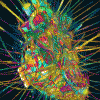(Peeps who have a solid understanding of neuroscience, psychopharmacology etc... I'd greatly appreciate your input.)
For the past 9 years or so I've been experiencing CFS with autonomic dysfunction related issues.
I've been living with my nervous system stuck in sympathetic overload. I have an extremely hyperactive nervous system that pretty much activates to anything and everything.
Severe unrelenting brain fog, exercise intolerance and reactions to foods. In short, whether its lifting weights, walking up a hill, doing yoga, drinking caffeine, eating certain foods, my sympathetic nervous system goes into major overdrive, so for reasons I can't fully comprehend these activities trigger a chronic stress response which worsens my already severe cognitive issues and fight/flight. It's like stabbing a nail into a high pressure gas pipe, there's a burst of shitty chemicals, adrenaline etc which is overwhelming to say the least.
As you'd expect, this nonsense has had a catastrophic impact on my social/work life.
Ketamine basically puts my body back in kilter, it makes me almost normal again. My nervous system responds normally to things as long as I've had a moderate dose of ketamine. I can function signficantly better, socialise with greater ease, eat the foods that I'd normally react to with a chronic stress response, I can exercise and feel my body reacting liking any normal body would when doing exercise. I feel energised and able to function rather than fatigued, chronically overstimulated and weak.
Apart from memantine, what are some strong NMDA antagonists I could try? Do you have any understanding of what might be going on here? If you have any advice or recommendations on how I can move forward, it'd be greatly appreciated!
I'm going to see if I can somehow get my hands on some Esketamine in the forseeable future.
Edited by YimYam, 03 May 2021 - 09:28 AM.
















































